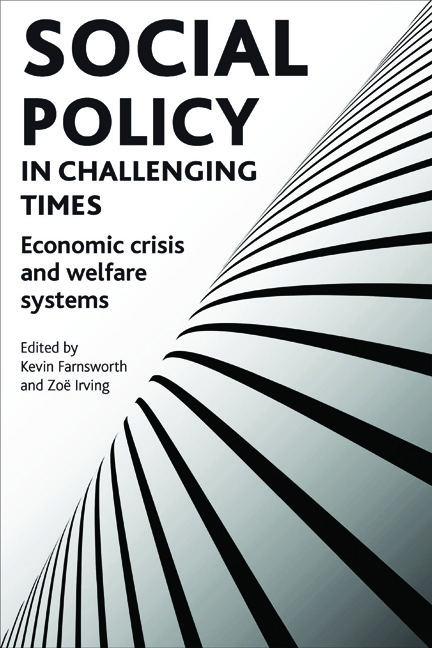Book contents
- Frontmatter
- Contents
- List of figures and tables
- Notes on contributors
- Acknowledgements
- one Varieties of crisis
- two The economic crisis and paradigm change
- three From financial crisis to fiscal crisis
- four Credit crunch, inequality and social policy
- five Global social policy responses to the economic crisis
- six Poverty, the crisis and social policy responses developing countries in developing countries
- seven South Korea after the 1997 economic crisis: a ‘paradigm shift’?
- eight China's response to crisis: what role for social policy?
- nine Tiptoeing through crisis? Re-evaluating the German social model in light of the global recession
- ten Ireland and the impact of the economic crisis: upholding the dominant policy paradigm
- eleven Waving not drowning: Iceland, kreppan and alternative social policy futures
- twelve Experiences from two financial crises in the Nordic welfare states: 1990-93 and 2008-10 compared
- thirteen Social policy and the recent economic crisis in Canada and the United States
- fourteen From economic crisis to a new age of austerity: the UK
- fifteen Responding to the challenges: some concluding remarks on welfare futures in changed circumstances
- Bibliography
- Index
one - Varieties of crisis
Published online by Cambridge University Press: 07 September 2022
- Frontmatter
- Contents
- List of figures and tables
- Notes on contributors
- Acknowledgements
- one Varieties of crisis
- two The economic crisis and paradigm change
- three From financial crisis to fiscal crisis
- four Credit crunch, inequality and social policy
- five Global social policy responses to the economic crisis
- six Poverty, the crisis and social policy responses developing countries in developing countries
- seven South Korea after the 1997 economic crisis: a ‘paradigm shift’?
- eight China's response to crisis: what role for social policy?
- nine Tiptoeing through crisis? Re-evaluating the German social model in light of the global recession
- ten Ireland and the impact of the economic crisis: upholding the dominant policy paradigm
- eleven Waving not drowning: Iceland, kreppan and alternative social policy futures
- twelve Experiences from two financial crises in the Nordic welfare states: 1990-93 and 2008-10 compared
- thirteen Social policy and the recent economic crisis in Canada and the United States
- fourteen From economic crisis to a new age of austerity: the UK
- fifteen Responding to the challenges: some concluding remarks on welfare futures in changed circumstances
- Bibliography
- Index
Summary
Scoping the crisis
The evolution of social policy is punctuated with key dates. All of the major developed welfare states have their own chronological milestones and some share key historical ‘moments’: the economic crisis of the 1930s, the Second World War and the 1973 oil crisis all stand out. However, no period in history is likely to prove to be quite so significant for quite so many welfare systems as is the late 2000s. The body of literature built around welfare state development suggests that the golden age gave way to an age of ‘limits’ followed by retrenchment (see Palier, 2006, pp 358-41), and now, it seems, welfare states are embarking on a new age of welfare: the age of austerity. As this chapter and those that follow demonstrate, however, the extent to which the economic crisis will impact welfare states in the short, medium and long term, depends very much on the objective ‘facts’ of the extent of economic collapse, and the more ideological dimensions of crisis management, which concern the ways in which the crisis has been defined, understood and responded to.
To comprehend what makes the post-2007 crisis more significant than any that preceded it, we must first understand its context. To begin with, it took place at a time of unprecedented international financial interdependence, most obviously illustrated by the impact of bad lending practices in a relatively small financial market – the United States (US) sub-prime mortgage market – on the subsequent financial bankruptcy of a relatively wealthy nation – Iceland. In the advanced economies, it also took place against a backdrop of relatively high levels of national social expenditure within mature welfare systems. Modern welfare states were barely formed during the 1930s and the British welfare state was less than 30 years old in 1973. Significantly, then, these financial crises were less deep than today’s, the devaluation of financial assets less significant and, crucially, the significance of state provision in the social and economic life of individuals far less universal.
Historically speaking, there have been many crises, the Financial Times noting that even in the short period between 1980 and 1996, the International Monetary Fund (IMF) reported 132 countries as having experienced ‘macroeconomic or financial crisis’ (Bevins and Cappitt, 2009).
- Type
- Chapter
- Information
- Social Policy in Challenging TimesEconomic Crisis and Welfare Systems, pp. 1 - 30Publisher: Bristol University PressPrint publication year: 2011

